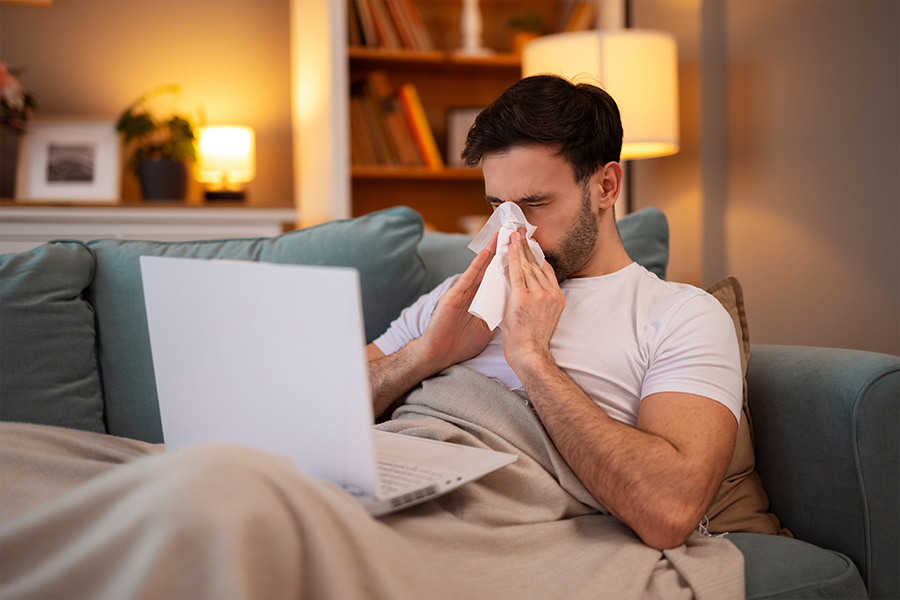
Can hayfever cause dry eyes?
Spring and summer are beautiful times of the year. The flowers bloom, the days are longer, and everything feels fresh. But for people with hayfever, it can also mean itchy eyes, sneezing, and stuffy noses.
At My Eye Clinic in Gosforth, we often see people who ask: “Can hayfever cause dry eyes?”
The answer is yes, it can! Let’s look at why this happens, what the symptoms are, and how you can help your eyes feel better.
What is hayfever?
Hayfever, or allergic rhinitis, happens when your body reacts to pollen from trees, grass, or flowers. Your immune system thinks the pollen is harmful, even though it’s not. It releases chemicals like histamine, which cause allergy symptoms such as:
- Sneezing
- A runny or blocked nose
- Itchy throat
- Watery or itchy eyes
Most people think hayfever only affects the nose and sinuses. But it can also affect your eyes, and that’s where the problem of dry eyes can begin.
How does hayfever cause dry eyes?
When pollen gets into your eyes, your body reacts by making your eyes water. You might think watery eyes can’t be dry, but here’s the tricky part.
When your eyes are irritated, they can make reflex tears. These are quick, watery tears that don’t have the same oils and mucus your eyes need to stay healthy. This can actually wash away the natural tear film that keeps your eyes moist.
As a result, your eyes might:
- Water too much
- Then feel dry again
- Burn or sting
- Feel gritty, like sand is in them
So even though your eyes are watering, they can still be dry and uncomfortable.
Common signs of hayfever-related dry eyes
If you have hayfever and your eyes feel sore or tired, you might have dry eyes too. Look out for these signs:
- Eyes that sting, burn, or feel scratchy
- Eyes that water a lot, especially outdoors
- Red or swollen eyelids
- A feeling that something is stuck in your eye
- Blurry vision that gets better when you blink
- Trouble wearing contact lenses comfortably
If you notice these symptoms, it’s a good idea to get your eyes checked. Sometimes, what feels like hayfever could also be dry eye syndrome, which can get worse over time if not treated.
How to ease dry eyes during hayfever season
The good news is that there are lots of ways to help your eyes feel better during pollen season. Here are some simple tips you can try:
1. Keep pollen away from your eyes
- Wear wraparound sunglasses when you go outside.
- Avoid touching or rubbing your eyes.
- Keep windows closed on high pollen days.
- Shower and change clothes when you get home to remove pollen.
2. Use a cool compress
Placing a clean, cool cloth over your eyes for a few minutes can help reduce itching and swelling.
3. Try artificial tears
Eye drops can help replace the moisture your eyes lose. Look for preservative-free drops if you have sensitive eyes.
4. Manage your allergies
You can also use allergy tablets or nasal sprays recommended by your doctor or pharmacist. These can help reduce overall allergic reactions, including those in your eyes.
5. Stay hydrated
Drink plenty of water to help your body, and your eyes stay hydrated.
When to see an eye specialist
If your eyes stay red, sore, or watery even after allergy season, it might be time to see an eye care professional. At My Eye Clinic in Gosforth, we can check if your symptoms are caused by hayfever, dry eye syndrome, or something else.
We offer dry eye assessments that look closely at your tear film, eyelids, and overall eye health. From there, we can suggest treatments tailored just for you, such as:
- Specialist eye drops
- In-office dry eye treatments
- Lifestyle advice for long-term comfort
Don’t let hayfever stop you from enjoying the outdoors. With the right care, you can keep your eyes healthy and comfortable all year round.
Final thoughts
Hayfever can make your eyes itchy, watery, and sore. But when those watery eyes start feeling dry, it’s a sign your eyes may need some extra care.
By taking small steps to protect your eyes, and by getting the right help when you need it you can enjoy clear, comfortable vision all season long.
If you’re in the Gosforth or Newcastle area, visit My Eye Clinic to learn more about dry eye relief.
Take the dry eye suitability self-test today and start your journey to more comfortable eyes.
How bad are your dry eyes?
Take this quick self-test to check how severe your symptoms are and see what help you might need next




